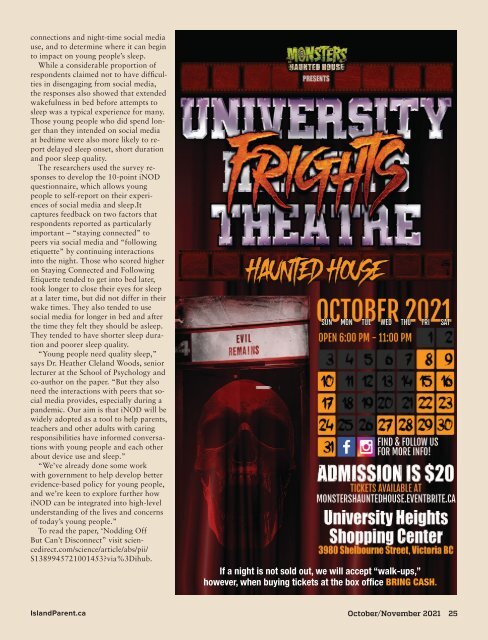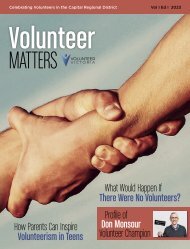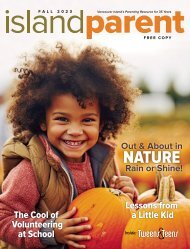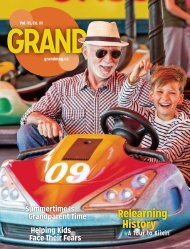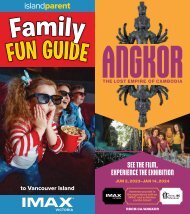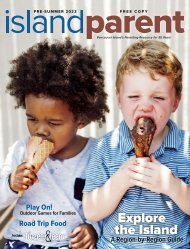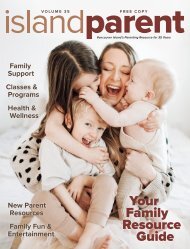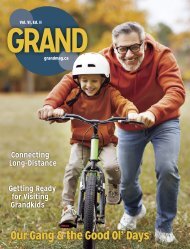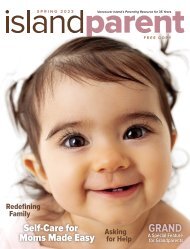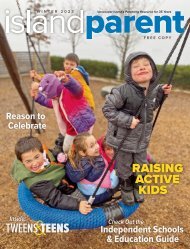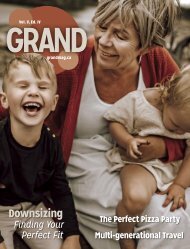Island Parent Magazine Oct-Nov 2021
Victoria, Vancouver Island parenting and family resource Special Feature: Tweens & Teens 6 Simple Strategies to Handle Stress A Weekend Away:Top 5 fall activities for families in Whistler Mixing Neurodiverse with Neurotypical Family & Friends
Victoria, Vancouver Island parenting and family resource
Special Feature: Tweens & Teens
6 Simple Strategies to Handle Stress
A Weekend Away:Top 5 fall activities for families in Whistler
Mixing Neurodiverse with Neurotypical Family & Friends
You also want an ePaper? Increase the reach of your titles
YUMPU automatically turns print PDFs into web optimized ePapers that Google loves.
connections and night-time social media<br />
use, and to determine where it can begin<br />
to impact on young people’s sleep.<br />
While a considerable proportion of<br />
respondents claimed not to have difficulties<br />
in disengaging from social media,<br />
the responses also showed that extended<br />
wakefulness in bed before attempts to<br />
sleep was a typical experience for many.<br />
Those young people who did spend longer<br />
than they intended on social media<br />
at bedtime were also more likely to report<br />
delayed sleep onset, short duration<br />
and poor sleep quality.<br />
The researchers used the survey responses<br />
to develop the 10-point iNOD<br />
questionnaire, which allows young<br />
people to self-report on their experiences<br />
of social media and sleep.It<br />
captures feedback on two factors that<br />
respondents reported as particularly<br />
important – “staying connected” to<br />
peers via social media and “following<br />
etiquette” by continuing interactions<br />
into the night. Those who scored higher<br />
on Staying Connected and Following<br />
Etiquette tended to get into bed later,<br />
took longer to close their eyes for sleep<br />
at a later time, but did not differ in their<br />
wake times. They also tended to use<br />
social media for longer in bed and after<br />
the time they felt they should be asleep.<br />
They tended to have shorter sleep duration<br />
and poorer sleep quality.<br />
“Young people need quality sleep,”<br />
says Dr. Heather Cleland Woods, senior<br />
lecturer at the School of Psychology and<br />
co-author on the paper. “But they also<br />
need the interactions with peers that social<br />
media provides, especially during a<br />
pandemic. Our aim is that iNOD will be<br />
widely adopted as a tool to help parents,<br />
teachers and other adults with caring<br />
responsibilities have informed conversations<br />
with young people and each other<br />
about device use and sleep.”<br />
“We’ve already done some work<br />
with government to help develop better<br />
evidence-based policy for young people,<br />
and we’re keen to explore further how<br />
iNOD can be integrated into high-level<br />
understanding of the lives and concerns<br />
of today’s young people.”<br />
To read the paper, ‘Nodding Off<br />
But Can’t Disconnect” visit sciencedirect.com/science/article/abs/pii/<br />
S1389945721001453?via%3Dihub.<br />
If a night is not sold out, we will accept “walk-ups,”<br />
however, when buying tickets at the box office BRING CASH.<br />
<strong>Island</strong><strong>Parent</strong>.ca<br />
<strong>Oct</strong>ober/<strong>Nov</strong>ember <strong>2021</strong> 25


